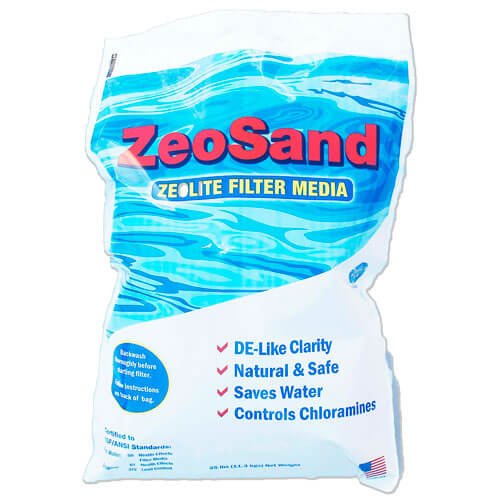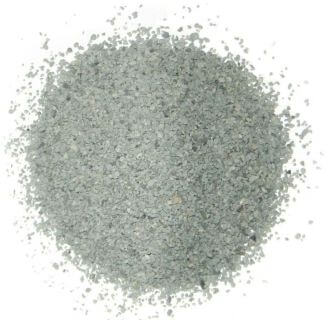FREE Standard Shipping On All Orders $100 or More!*
Pool Filter Sand Alternatives
Even though they are called sand filters, you don't need to use sand for the filtration media in your sand filter. If you decide you’d like to make a change you can have product on hand so you are ready to open the pool as soon as the weather cooperates.
If you have had a sand filter for a while, you are most likely already aware that the standard filter media to use is called #20 silica sand. This sand is about .45-.55 mm in size and is capable of filtering out debris about 20-40 microns in diameter. As a reference, the diameter of the average human hair is 60-80 microns. Assuming you have good eyesight, particles that are smaller than 30-40 microns are generally no longer visible to the naked eye.
ZeoSand and FilterGlass are two alternatives to standard silica sand, and each of them can generally increase the filtration capacity of your sand filter to less than 5 microns, which is comparable to the filtration capability of a DE filter.
FilterGlass
FilterGlass is made of finely crushed recycled glass. The glass particles are smooth to the touch, so no worries about adding sharp, jagged glass into your pool filter. Each piece is uniquely shaped (known as amorphous), making it less likely to "channel" as silica sand can over time. FilterGlass has a slightly negative electrical charge that allows it to hold fine, positively charged particles such as iron and manganese.
- FilterGlass filters out particles as small as 2-5 microns.
- Excellent at removing metals like iron and manganese.
- Removes skin cells, blood cells and 70 percent of all bacteria.
- Backwash about 75 percent less, saving water and chemicals.
- Use 20 percent less FilterGlass than you would silica sand.
- Compatible with all sanitizers, clarifiers and metal removers.
- Does not require backwashing after adding FilterGlass.
ZeoSand

ZeoSand is made of 100 percent natural zeolites (minerals found in volcanic rock). The zeolite particles have a three-dimensional honeycomb structure that gives a cubic foot of ZeoSand about 100 times the surface area as a cubic foot of sand, allowing smaller particles to be trapped.
Because of its lower density and the way that zeolites lay against each other, you'll use about half as much ZeoSand by weight than regular filter sand.
- ZeoSand filters out particles as small as 2-5 microns.
- Traps ammonium ions responsible for chloramine formation.
- Lasts longer than sand and requires 50 percent less backwashing.
- Use 50 percent less ZeoSand than you would silica sand.
- Removes and kills bacteria with a molecular sieving process.
- All natural and environmentally friendly.
Which Should You Choose?
FilterGlass and ZeoSand will each remove particles under 5 microns in size, so they will both dramatically improve the clarity of your pool water over silica sand. However, as you can see above there are some differences between the two, which may make one a better choice than the other depending on your needs.
If you use well water or find yourself constantly battling metal stains, then perhaps the FilterGlass would be a better choice due to its enhanced ability to remove metals from the water.

If you find that you need to shock frequently, perhaps it’s worth trying the ZeoSand to benefit from its ability to trap chloramine-causing ammonia. This will reduce the need to shock the pool and reduce red eyes, itchy skin and that chlorine smell.
Both of these pool filter sand substitutes require much less backwashing than regular sand, though the FilterGlass will require the least. Less backwashing means less pool water and chemical waste and more time on your hands!
Standard silica sand costs about $10-15 per 50-pound bag. You generally can obtain this product at a local pool supply or hardware store. Most companies (including In The Swim) do not sell the sand online because the cost to ship the sand is generally just as much, if not more, than the sand itself.
There is no doubt that both the FilterGlass and ZeoSand are both significantly more expensive per 50-pound bag (current prices are $40-$45 per 50-pound bag), but when you consider you will use less of the product (especially in the case of ZeoSand where you use half has much) and will likely use much less clarifier and other chemicals, they are still attractive from a cost standpoint.